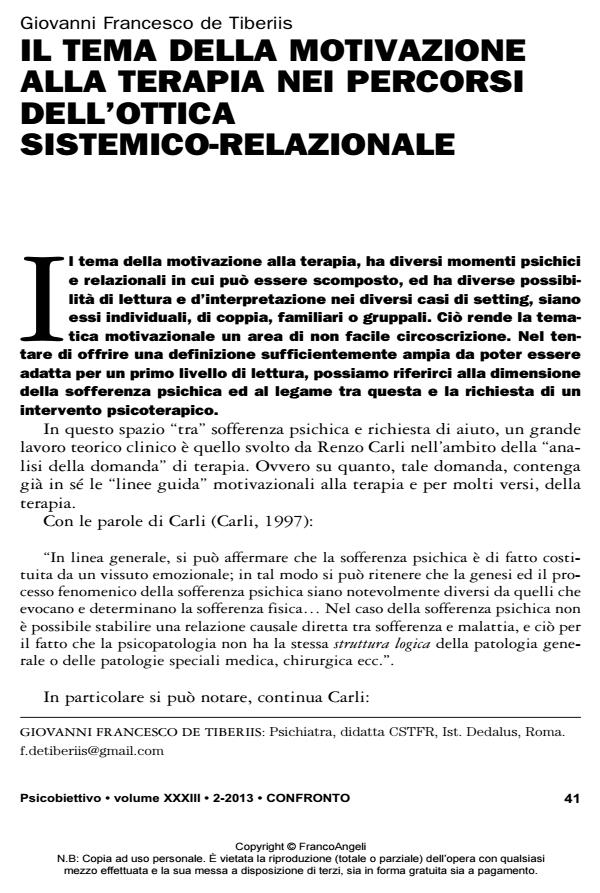Il tema della motivazione alla terapia nei percorsi dell’ottica sistemico-relazionale
Journal title PSICOBIETTIVO
Author/s Giovanni Francesco de Tiberiis
Publishing Year 2013 Issue 2013/2
Language Italian Pages 12 P. 41-52 File size 152 KB
DOI 10.3280/PSOB2013-002004
DOI is like a bar code for intellectual property: to have more infomation
click here
Below, you can see the article first page
If you want to buy this article in PDF format, you can do it, following the instructions to buy download credits

FrancoAngeli is member of Publishers International Linking Association, Inc (PILA), a not-for-profit association which run the CrossRef service enabling links to and from online scholarly content.
This article examines, through the subject of "Psychotherapy Demand Analysis", the different areas of motivation that constitutes the basis of requesting psychotherapy. These areas may assume three different forms: Affiliation, Power and Performance. Starting from these points the article evaluates the characteristics offered by the patient (or the institution acting on his behalf) to the psychotherapist, and assesses the possible risks of collusion in the health system. Starting from this conceptual frame, the reader is presented with a link and a comparison between these areas of motivation and the main lines of technical/clinical development of the theory of human systems and relations. The Affiliation area is re-read through the work of S. Minuchin and his school. Following this school of thought, affiliation is a form of relationship proposed to the therapist, for example from a family, which often presents itself as disfunction characteristic of family nexuses. It is well remarked the tendency to delegate roles and functions to other systems and sub-systems, through, for example, inter-generational alliances, or blurring of borders normally set between family sub-systems, ecc. The Author’s work is based upon building, within the therapy space, a path that allows for the assumption of competences and responsibilities of each member of the mentioned system. The Power area has been thoroughly explored in the research and clinic work of other Authors, like J. Haley, M.H. Erikson et al. They have examined, under different perspectives, the subject of power dynamics as an intrinsic element of the relationships’ built between interacting systems or people. In relation to the Performance area, the contribution of various authors, which have been confronted with specific psyco-pathological situations, is examined. Among these situations, those which can be attributed to psychosomatic disorders, alimentary disorders or drug addiction are highlighted. The request of the "performance", not considering a deeper involvement in the psychotherapist action, is often a constitutive element of these psychopathological areas. As for this, the psychotherapist is charged with making specific interventions aimed at recovering an affective and emotional dimensions that are often inter-generational, deeply buried and painful to be recovered.
Keywords: Psychotherapy Demand; Motivational Areas; Affiliation Area; Power Area; Performance Area; Systemic Psychotherapy; Psychosomatic Disorders; Behavior Alimentary Disorders; Drug Addiction.
Giovanni Francesco de Tiberiis, Il tema della motivazione alla terapia nei percorsi dell’ottica sistemico-relazionale in "PSICOBIETTIVO" 2/2013, pp 41-52, DOI: 10.3280/PSOB2013-002004